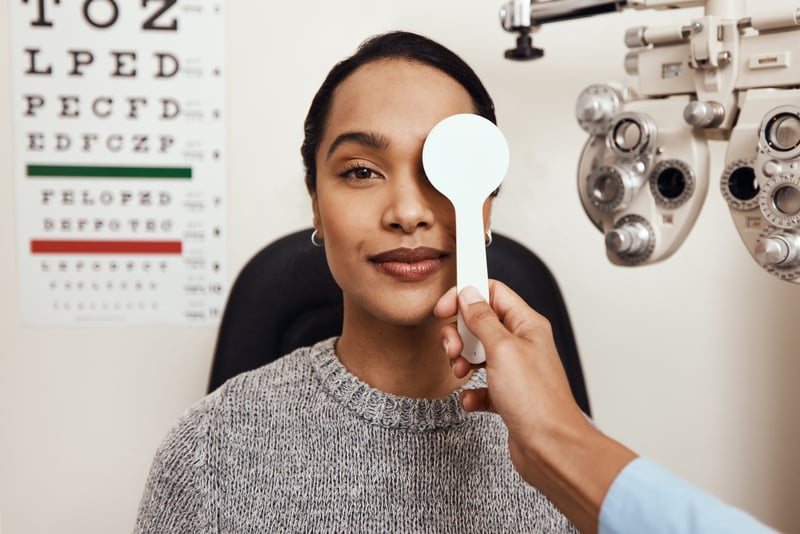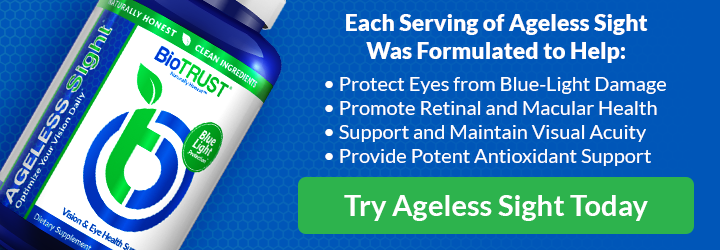How to Improve Vision at Any Age (12 Natural Tips)

There’s no denying how important vision is, but it’s also something many of us take for granted. It’s just something we do—see. Yet, neglecting eyecare can also have devastating consequences, especially as we age. While there’s a lot of information available on practicing dental hygiene, taking care of our skin, and exercising our bodies for optimal health, few of us know all that much about caring for our eyes. For example, we’ve never learned how to improve vision, or honestly, if it’s even possible. This seems to be true even for people who wear corrective lenses or have noticed their vision is declining.
Yet it’s even more important today than ever before to learn how to improve vision as our eyes are bombarded with stresses and strains not experienced in the past. These disruptions can include:
- Staring at computer screens for hours on end
- “Relaxing” in front of a TV screen late into the night
- Relying on smartphones and staring into those small screens when away from the computer
- Increased exposure to pollution
- Reading in dim, poor lighting
- Consuming unhealthy diets—or at least missing out on nutrients important for eye health
- Lack of exercise and leading a mostly sedentary lifestyle.
Plus, as we age, our vision can change. Common changes include:
• Presbyopia, when the lens starts to lose its ability to change shape, so it’s more difficult to focus up close. At first, in your late 30s and into your 40s, you may just be able to hold reading materials a bit farther away from you. Later, you may need reading glasses or another type of correction.
• Decreased pupil size, as the muscles that control how the pupil responds to light get weaker, more light is needed for reading comfort. It can also take a bit more time to adjust to brighter light after leaving a dimly lit area (such as leaving a movie theater during the middle of a sunny day).
• Dry eyes, due to the decrease in tears we are able to produce as we get older. This is more common for women (especially after menopause) and can lead to stinging, burning discomfort.
• Decreased peripheral vision, which reduces the visual field by nearly 20 to 30 degrees by the time we reach our 70s and 80s.
• Less sensitivity to color and brightness as cells in the retina that are responsible for color vision naturally decline. As a result, brighter colors may appear more faded, or you may see less contrast between colors.
• Increased eye floaters, that is, spots, dots, specks, or rings in your vision. These are often harmless, but if they appear suddenly, they could indicate eye issues.
There are no surefire proven methods for how to improve eyesight (other than corrective eyewear) for common vision impairments like astigmatism, nearsightedness (myopia), farsightedness (hyperopia), and age-related declines (presbyopia), as these are determined by the shape of our eyes, which influences the level of refractive error.
That said, there are steps we can take to help maintain and potentially improve our eyesight by supporting eye health.
How to Improve Vision: 12 Ways to Enhance Eye Health
1. Give Your Eyes a Break
Whether looking at a computer for work, enjoying some screentime entertainment, or staying connected via your smartphone or tablet, most of us spend a lot of time looking at a screen, and that can lead to tired, stressed-out eyes.
Whenever using any device for extended periods, be kind to your eyes by giving them regular breaks. For example, follow the 20/20/20 rule. That is, every 20 minutes, give your eyes a 20-second break by looking 20 feet away. For example, you can look out a window at nature, enjoy some artwork in your home or office, or allow your eyes to roam to look at a friend, loved one, or pet.
2. Eat a Healthy, Nutrient-Rich Diet
Antioxidants, vitamin A, and omega-3 fatty acids are all needed to help support eye health. Foods like dark leafy greens, carrots, and fatty fish like salmon, sardines, and mackerel are all part of a healthy diet that supports vision and may even help slow down age-related loss of vision.
For example, vitamin A is known for helping support night vision or seeing when light is low. The antioxidants lutein and zeaxanthin are other nutrients known to support vision. These vitamins and antioxidants are found in many common foods, including sweet potatoes, pumpkins, carrots, kale, spinach, collard greens, liver, Swiss chard, zucchini, Brussel sprouts, eggs, and butter.
Vitamins C and E as well as zinc are also vital for healthy eyes. They can be found in a variety of foods such as broccoli and oranges, almonds and peanut butter, and red meat and shellfish, respectively. The mineral selenium can also help support the absorption of vitamin E.
Not only will these healthy foods help enhance eye health, but they’re also good for the rest of the body too!
3. Consider supplementing
Because it’s not always easy to get a wide range of nutrients that support eye health, it can be a good idea to consider adding a supplement designed to provide eye-supporting antioxidant carotenoids like lutein, zeaxanthin, and meso-zeaxanthin, as well as vitamins C and E, and the minerals zinc and copper to your daily diet.
Meso-zeaxanthin appears to be one of the most supportive nutrients for eye health, and it’s only available in a few foods, such as trout and shrimp, so supplementation may be a good way to ensure you’re getting enough.
4. Get enough shut-eye
Overly tired eyes can become gritty, dry, and easily strained eyes that find it difficult to focus. Ensuring you get enough sleep every night can prevent the eyes from getting overly worn out, which may help you optimize your vision. Shoot for seven to nine hours of sleep every night.
5. Exercise regularly
Staying active can help increase blood circulation as well as oxygen delivery throughout the body, including the eyes. This can shuttle the nutrients needed to the eyes to help them stay nourished. It may also decrease dryness.
Walking, hiking, cycling, dancing, and weight training are all great ways to stay active and ultimately help protect eye health and improve vision.
6. Stay hydrated
Your eyes need a healthy supply of water to stay lubricated and produce natural tears. Otherwise, the eyes can start to feel dry, scratchy, and uncomfortable. Worse, the more you stare at screens, the more itchy, dry, and uncomfortable they can feel. So, sip on water throughout the day.
7. Wear eye protection
When using equipment, wearing the proper eye protection can reduce the risk of injuries and stress due to debris that flies into the eyes. Eye protection also includes wearing polarized sunglasses with UVA and UVB protection. This can help protect the eyes from the harmful rays from the sun that may diminish eyesight over time. As a bonus, they also help protect the delicate skin around the eyes from squinting to potentially slow wrinkling like crow’s feet.
Choose sunglasses that are polarized and are labeled “up to 400 nm UV absorption” or 100% UV blocking for the greatest benefit.
8. Keep them clean
Before going to bed every night, make sure you remove all of your eye makeup (if you wear it). This can help prevent small particles of eye makeup or mascara from ending up in the eye to potentially scratch the cornea.
Of course, before touching your eyes, such as when putting on or taking off makeup or dealing with contacts or other eyewear, make sure your hands are clean, and avoid putting any chemicals not made for eyeballs into your eyes.
9. Don’t smoke
Smoking increases the risk for a wide range of health issues, including eye damage. For example, smoking has been shown to increase the risk for optic nerve damage, macular degeneration, cataracts, and more. This is due to the reduced amount of oxygen that’s available to the retina as well as the damage inflicted on the small blood vessels found in the eyes. So, if you don’t smoke, don’t start. And if you do smoke, it’s never too late to stop.
10. Keep wearing your corrective eyewear
If you’re already wearing glasses or contacts, continue to do so. Using the appropriate eyewear doesn’t make your eyesight worse as it can’t change the refractive error that causes it or change the shape of your eyes. Eyewear just helps you see better if you need it.
11. Try eye exercises
Research suggests it may be possible to help change the way your brain and eyes work together. For example, kids who have “lazy eyes” (aka amblyopia) have used special exercises to help their eyes and brains better communicate to work as a pair, which then improves vision.
Eye exercises for adults, however, are much more controversial. That said, the exercises mentioned below may help give the eyes a break and thus reduce eye strain. They may also help improve focusing ability. This may or may not really impact vision. Still, if eye strain is something you battle, they may at least be worth trying.
• Palming: Rub your hands together to get your palms nice and warm. Then gently cup your palms over your closed eyes, without adding any pressure. Relax and breathe for up to five minutes with your palms over your eyes.
Other options are to use a hot or cold compress to place over your closed eyes. While there’s no evidence that these can help improve vision, they may help decrease tension and eye strain and can be a nice way to relax after focusing on a screen for a long period of time.
• Eye Rolls: Start by looking up and then circling your eyes in one direction six to ten times. Then reverse the direction.
You can also try using a figure-eight movement with your eyes by focusing on a point about 10 feet in front of you and drawing this figure by moving your eyes. Again, remember to switch directions.
Finally, another method is to draw the ABCs (or your name, if you’re short on time) with your eyes, making the letters nice and big, so your eyes use a full range of motion. The goal is to help improve object tracking.
• Pencil (or Pen) Focus: Hold a pen, pencil, or even finger an arm’s length away. Focus on the object and then move it closer slowly until it’s only around six inches from the nose (not close enough to start seeing double, though). Then slowly reverse and move the object away from your face, continuing to hold your focus. Look away and into the distance for a moment, and then repeat for three to six rounds.
If you do use vision correction, especially to correct near vision, make sure you’re wearing it while performing this exercise.
• Near-Far Focus: Start by focusing on an object that’s just about 10 inches from you. Focus for about 15 seconds. Then choose an object that’s around 10 to 20 feet away. Focus on that object for another 15 seconds. Alternate your focus between the two objects for around five rounds to help your focusing system engage.
• Blinking: Just as it sounds, slowly close your eyes and allow them to rest for a moment. This may help reduce eye fatigue. When we use digital devices, our blink rate tends to slow, causing the eyes to dry out and fatigue, so taking time to consciously blink may help restore moisture and help the eyes relax.
The goal with the above exercises is to help strengthen the eye muscles as well as reduce eye strain. However, there’s not yet evidence to indicate if this is a possible way to actually improve vision. If it feels good after a long day or it helps take your eyes away from a small screen, great. But also, don’t fall for the claims that a certain eye-training program will allow you to give up your glasses—there’s no evidence for that.
12. Get regular eye exams
One great way to ensure your eyes stay healthy and to catch problems before they get severe is to have an eye exam every two or four years, depending on your age. If, however, you’re noticing unexplained changes to your eyes, it may be helpful to make that appointment now. Your ophthalmologist can provide suggestions on how to improve vision and eye health, especially if it’s time for corrective options from glasses to surgery.
How to Improve Vision: A Recap
Even though we tend to take it for granted, vision is vitally important throughout our lives. And it will change as we grow older. Fortunately, there are simple, natural steps we can take to help support eye health and learn how to improve vision, including eating a nutrient-rich diet, exercising regularly, getting enough sleep, and giving our eyes a break by taking our eyes off a screen and really looking at nature, art, and the wonderful world around us.









